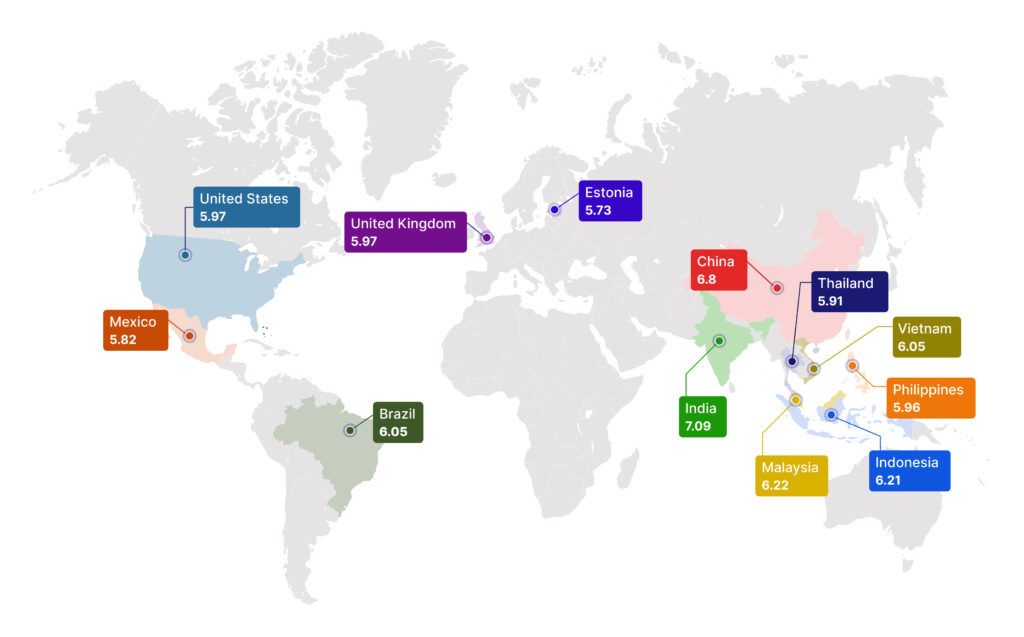Hiring - Getting a reliable remote team starts with selecting the right people. Remote team players must be independent and take the initiative, knowing what's essential without needing a constant nudge. At the same time, they shouldn't be lone wolves, as teamwork and communication remain essential for a team’s success Here is a framework for building successful remote software teams :
- Skill Set Alignment : Prioritize candidates whose skills align with the specific requirements of remote work. Look for individuals who demonstrate proficiency in self-guided tasks, problem-solving, and remote collaboration.
- Autonomy and Initiative : Seek out candidates with a strong sense of independence and initiative. Remote team members should be capable of making decisions independently and taking ownership of their work without constant supervision.
- Past Remote Experience : Prior experience with remote work can be an asset. Candidates who have successfully navigated the challenges of remote collaboration may adapt more quickly to the dynamics of your team.
Communication - Another important aspect is communication, which is essential for many reasons, including defining goals, setting expectations, discussing progress, and working through any issues or challenges. Let's understand why communication is critical and how to tackle it.
- Nail Down Your Goals. Make sure everyone knows what the project is about. Put all the info in one spot that everyone can easily access. And don't forget to touch base on goals regularly, especially for big or complex projects.
- Set Right Your Expectations. In remote setups, knowing your role inside out is crucial. Once you've set the goals, ensure each team member knows their following line of action. Make the information available for everyone can see – it's like a map for each person.
- Track Your Progress. Use smart tools to keep tabs on tasks and timelines. Agile methods like Scrum or Kanban are a great fit here, as they work like GPS, helping everyone stay on track.
- Talk Out Loud for Any Issues. Address your problems as early as possible. Team leaders should make sure everyone feels comfy speaking up. And having a solid process for solving issues together is a must.
Relationships - Once your remote software team is set, build strong relationships. Trust is key – leaders trust their team by avoiding micromanagement and valuing their input. Team members trust leaders to make smart decisions and distribute work fairly. Mutual trust between team members is vital, too, respecting differences and leveraging diversity. Outside work, create bonding opportunities like virtual socials or chats. Remember, strong relationships boost team effectiveness and satisfaction.
Methodology - Imagine a remote software team as a team of chefs crafting a delightful meal together. Just like in a kitchen, a well-defined plan is crucial. Agile methodologies are akin to the chefs' recipes – adaptable and flexible. Agile allows adjustments if an ingredient is missing, just like chefs substituting ingredients. It enables the remote team to adapt to changes and challenges. Agile divides the project into smaller portions instead of cooking the entire meal at once. Each team member focuses on their part and then collaborates to refine it. Agile ensures stakeholders regularly taste progress, mirroring chefs sharing tastes while cooking. This ongoing feedback refines the outcome. Agile practices offer several valuable components.
- Daily Alignment Meetings: These are your daily stand-up or scrum meetings. They're brief check-ins where team members share progress, upcoming plans, and any roadblocks. These meetings foster cohesion, troubleshoot challenges, and ensure everyone is on the same page.
- Initiating Sprints: There's the sprint planning session at the outset of each sprint. This involves the development team, scrum master, and product owner. It's a strategic discussion about tasks and deadlines for the upcoming sprint.
- Reflecting and Refining: After every sprint, there's a retrospective. This meeting involves the development team, scrum master, and product owner. It's a constructive review of the recently concluded sprint, focusing on successes, areas for improvement, and strategies for upcoming sprints.
- Backlog Refinement: This ongoing collaboration involves the product owner and the development team. They collaboratively review, clarify, estimate, and prioritize items on the backlog. This ensures that the backlog is well-prepared for future sprints.
- Seamless Code Management: Continuous integration and continuous delivery (CI/CD) streamline development. CI involves integrating changes into a shared code repository and systematically testing them. CD entails deploying validated code into production or staging environments.
- Visualizing Progress: Burndown charts serve as visual progress trackers. These charts depict the remaining work versus the remaining time within a sprint or project. They facilitate real-time monitoring, helping the team address potential challenges and adhere to objectives and timelines.
Infrastructure - The previously discussed components come to fruition through a well-structured infrastructure encompassing networking, applications, software, and security. Let's delve into the tools that exemplify this concept.
- Smooth Internet Connections - Imagine trying to talk to your team through a video call, and it keeps freezing or sounds like a robot. Having a stable and speedy internet connection is like having a clear path to your virtual team hangout. It helps you avoid awkward lags during chats and steady your online tools access.
- Your Online Private Hideout: VPNs - When you're working from somewhere other than your usual office, it's like setting up shop in a different neighborhood. Virtual Private Networks (VPNs) ensure your connection to your company's digital realm is secure and private. They're like your own secret tunnel to keep your data safe.
- Virtual Knocking on the Door: Remote Access - Sometimes, you must reach your work stuff even if it's not physically with you. Tools like Secure Shell (SSH) act like your digital key to unlock access to your work servers and resources from anywhere. It's like magically being in two places at once.
- Team Chats and Digital Whiteboards - Communication is at the heart of remote teamwork. Like chatting with your teammates around the water cooler, you've got digital platforms like Slack for instant messaging and Zoom and Microsoft Teams for face-to-face virtual catch-ups.
- Keeping Code in Harmony: Version Control - Imagine writing a story with your team, but everyone's writing in different books. Version control systems, like Git and SVN, are magical pens that let you all write together, track changes, and ensure your story (code) is always in sync.
- Cloudy Creativity: Cloud-Based Workspaces - Ever wanted to code or design something extraordinary, but you're not at your usual desk? Cloud-based platforms like GitHub Codespaces and AWS Cloud9 are like having your entire workspace in the cloud. You can build and test your creations from anywhere.
- Teamwork, Code Style: Collaboration Tools - Coding is like a jam session. Code review tools, such as GitHub Pull Requests and GitLab Merge Requests, are like getting feedback on your riffs and tunes from your fellow band members. It helps keep your code sounding sweet and working smoothly.
- Sharing the Knowledge Campfire - Imagine having a place to put all your camping tips and tricks so everyone can benefit. Documentation tools like Confluence and knowledge-sharing platforms like SharePoint are like setting up a digital campfire. You can share important project info, coding tips, and best practices.
Professional and Personal Development- While the other factors we've discussed is essential, it's not the whole picture regarding keeping a remote software development team operating at full capacity. To ensure the best results, businesses must ensure their team members have chances to grow personally and professionally.
- One practical approach involves organizing informative lunchtime learning sessions, facilitating mentorship opportunities, granting team members access to industry conferences, and facilitating enrollment in courses and workshops for acquiring certifications. The central goal is to customize the learning experience for everyone, addressing their specific desires and requirements.
- Shifting the focus to the personal sphere, particularly relevant for our remote workforce, prioritizing the team's well-being holds immense significance. A healthy and content team positively influences productivity. Thus, a commitment to nurturing mental health is paramount. This entails promoting the importance of regular breaks and mental rejuvenation. Moreover, resources are available to provide support when individuals encounter challenging times. This collective mindset reinforces a sense of unity within the team.
- However, actions speak louder than words. Adhering to the principles we advocate is essential. We pledge to respect your time beyond work hours and to lead by example in embracing vacation time. In doing so, we set a standard for a harmonious work-life balance and encourage you to do the same – taking proactive steps to care for yourselves.
There are plenty of options for outsourcing software development offshore, but according to Statista, India was ranked as the most attractive destination for offshore business services in a 2021 survey. The survey found that India scored highly on two key factors: financial attractiveness (2.83 out of 3) and availability of staff and skills (2.18 out of 3).
- India's financial attractiveness is due to its low labor costs and favorable tax rates. The country also has a large and growing pool of skilled workers, many of whom are fluent in English.
- The availability of staff and skills is particularly important for offshore business services, as these services often require a high level of technical expertise. India's large pool of skilled workers makes it an ideal destination for companies that need to outsource their business services.

